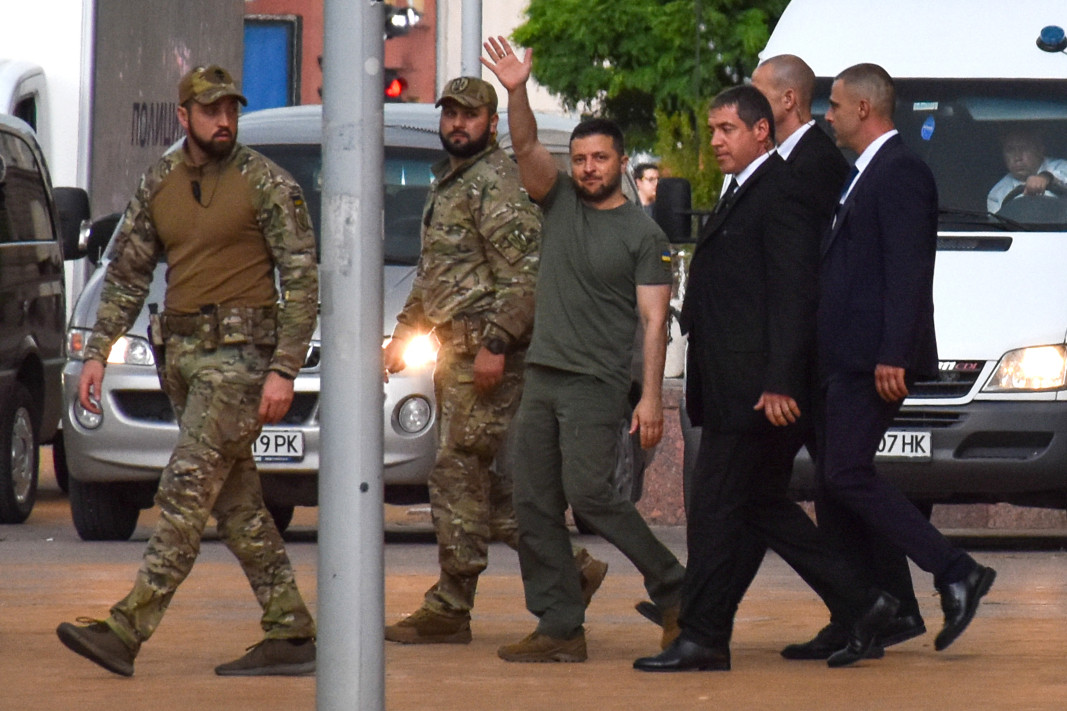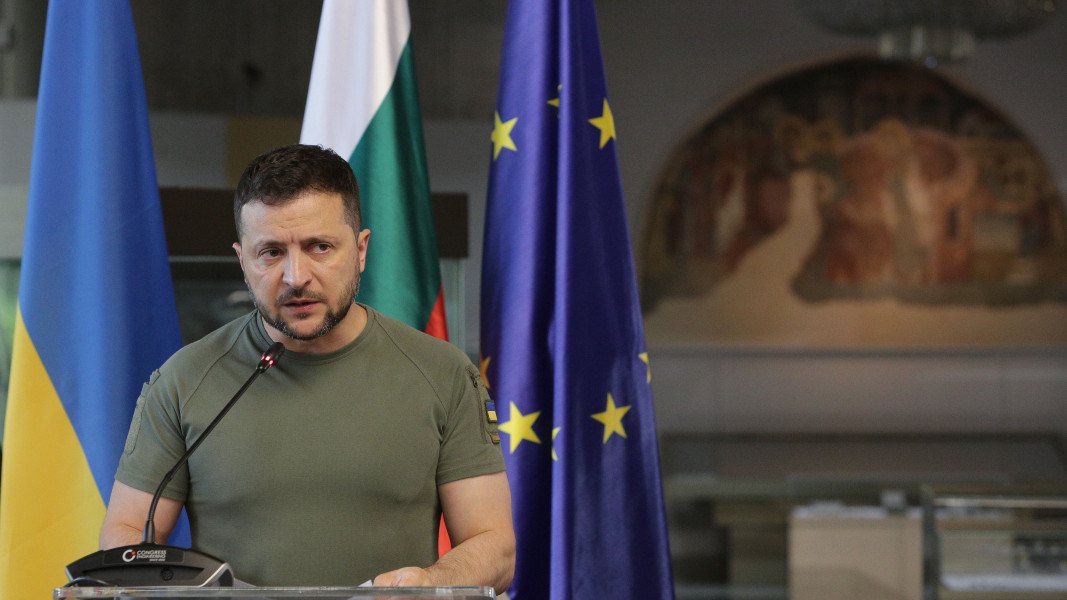The first emblematic visit by the President of Ukraine Volodymyr Zelensky to Bulgaria’s capital city lasted half a day. Watching the reactions and the coverage in the media in Bulgaria from the start of the day, the ordinary listener and viewer was bound to feel they were inside Gogol’s play “The government inspector”, with everyone talking at the same time, arguing, with nothing seeming to be certain - is he here, is he coming, what is he going to say, what is he going to demand, what is going to happen? This kind of media attention or level of security is something we had not seen in Sofia since the visit by US President Bill Clinton in 1999, the war in Kosovo or the visit by Pope John Paul II in 2002. At midday, the Bulgarian government plane landed in Sofia, with the Ukrainian delegation and Volodymyr Zelensky on board. Inside what is known as the triangle of power in Sofia’s city centre (the space locked between the buildings of the National Assembly, the Presidency and the Council of Ministers), the visiting delegation first entered the Council of Ministers.
“Volodymyr Zelensky’s visit as such is very important,” Prof. Dimitar Vatsov, lecturer at New Bulgarian University said in an interview with the BNR. “He is, in effect, the leader of the free world right now. We can safely say it is not Joe Biden (president of the US), and it is not Ursula von der Leyen (president of the European Commission), but in a real, living-and-breathing sense, Zelensky is the person who is, so to say, the standard of our freedom at the moment… And he didn’t just come to Bulgaria, he came here to express his gratitude, he particularly laid emphasis on that – for the military aid, but also for the Ukrainian refugees.”
After talks with the cabinet of Prime Minister Nikolay Denkov, Zelensky said agreement had been reached “to intensify cooperation with Bulgaria in the defence sector. The assistance you are rendering us, we are counting on this cooperation which is helping us protect many people. We are continuing the discussions on the medical treatment of Ukrainian soldiers in your country. We discussed cooperation in energy – a sphere that is increasingly becoming a priority in the cooperation between the two countries. We are counting on you for Ukraine’s future membership of the EU and of NATO.”
Even though Zelensky arrived in this country at the invitation of the government, in accordance with protocol, the Bulgarian President Rumen Radev received his Ukrainian counterpart in the Presidency building.
To say the meeting between the two presidents was interesting would be an understatement, because what we saw was a head-on collision between two opposing philosophies. One was the philosophy of Bulgaria’s President Rumen Radev who has been saying over and over again that giving Ukraine military aid will drag Bulgaria into the war. The same thing that the spokesperson for the Russian president Dmitry Peskov said about Bulgaria in a comment on Zelensky’s visit to this country. It is a narrative spread by numerous pro-Russian circles all over Europe, the same people who organize “peace and neutrality” marches, and this is something that is happening in Bulgaria, but in many other places as well. They are all saying the same thing – that a peaceful solution must be found immediately, that the countries must not take sides, i.e. that they must not help Ukraine.
“I would like to express our solidarity with the people of Ukraine and with the victims of this brutal war that is raging there at the moment,” Bulgaria’s President Rumen Radev said at the beginning of the meeting.
Zelensky asked him why he did not support the signing of the Bulgarian-Ukrainian memorandum on munitions. “Are you saying this as commander-in-chief – because you do not want to weaken your army, or because you don’t support the strengthening of Ukraine? Those are two different things. Everything your army has will not be enough to fight the Russian Federation if it comes here. Not because your army is weak, but it would not be enough to fight against a country of 160 million, that is why it is a good thing to enable people to defend themselves. War knows no distances. If, God forbid, a tragedy takes place, if people you share the same values with do not help you with weapons, what are you going to do,” Zelensky said in answer to Rumen Radev.
Former Minister of Foreign Affairs Lubomir Kyuchukov commented for the BNR that “this visit would appear to be more important to Bulgaria than it is to Ukraine”.
“Instead of Bulgaria’s empathy, the political comments and assessments seem to be dominated by Ukraine’s appraisal. We are left with the impression that it is not Ukraine that needs our help, but that Bulgaria needs Ukraine to lend it legitimacy, which is, to a certain extent an expression of complexes on the home front, and an attempt, by some Bulgarian politicians, to earn a high international profile.”
The Ukrainian president did not address parliament in plenary because the parties Vazrazhdane and the Bulgarian Socialist Party refused to hear him out, but he did meet with the parliamentary forces from the majority which support the defence of Ukraine.
But unlike the final silent scene in Gogol’s “The government inspector”, Zelensky’s visit to Sofia ended with a press conference with Bulgarian media that was eminently open and emotional. It is going to go down in history, not because it took place at the National Museum of History, but because in conversation with Bulgarian media, Volodymyr Zelensky fought off Russian propaganda in Bulgaria so vigorously. 
“More than 140,000 have received protection in Bulgaria. You are applauding me, I would like you to applaud yourselves for everything you have done for our people,” Zelensky said in the museum hall which, coincidentally or not, displays exhibits from medieval Great Bulgaria. From there Bulgarians set out, on the territory of what is today Ukraine and Crimea, to ultimately settle in the Balkans.
“We have been making efforts to bring our people back, to their homes in Ukraine, to make the country safe. That is essential and we feel it can become possible. It all depends on the power of this important support we are using for our defence,” the Ukrainian president said.
“We all grew up with the words of the prominent figures from our National Revival: Freedom or death. There is no symbol of this motto more potent than what the Ukrainians are fighting for today. We hope the Ukrainians will attain peace,” said Bulgaria’s Prime Minister Nikolay Denkov at the end of the discussion at the National Museum of History.
After which the president of Ukraine left for Prague. Pity he wasn’t able to spend a whole day in Bulgaria.
Translated from the Bulgarian and posted by Milena Daynova
Photos: BTA
Romania continues policy of gradual budget deficit reduction Romania should end the year with a budget deficit amounting to 8.4%, as compared to 9.4% at the end of 2024, as negotiated with the EU, PM Ilije Bolojan has announced. During his visit..
GERB-SDS party maintain their dominance in new parliamentary elections with 26.4%, show the results of a survey by the sociological agency "Trend". The poll was conducted on behalf of 24 Chasa daily through a direct standardized "face-to-face" interview..
A new path ahead for the European Union – this is what the President of the European Commission Ursula von der Leyen outlined in her annual state of the union address in Strasbourg a few days ago. To summarize – the economic and military..

+359 2 9336 661
